#and in that moment evil triumphed
Text
While Tucker Carlson is back on the news for his embarrassing trip to Russia, I still don't think we talk nearly enough about his greatest crime. Thanks to him, millions of old folks across the United States, including my own grandmother, for however short a time, had to find out who Chris Chan was.
#tucker carlson#chris chan#i still wake up in a cold sweat thinking about the time that name left my mimi's mouth#two worlds that should have forever stayed seperate#for one brief horrible agonizing moment#became one#and in that moment evil triumphed#thanks tucker#its all your fault
0 notes
Text
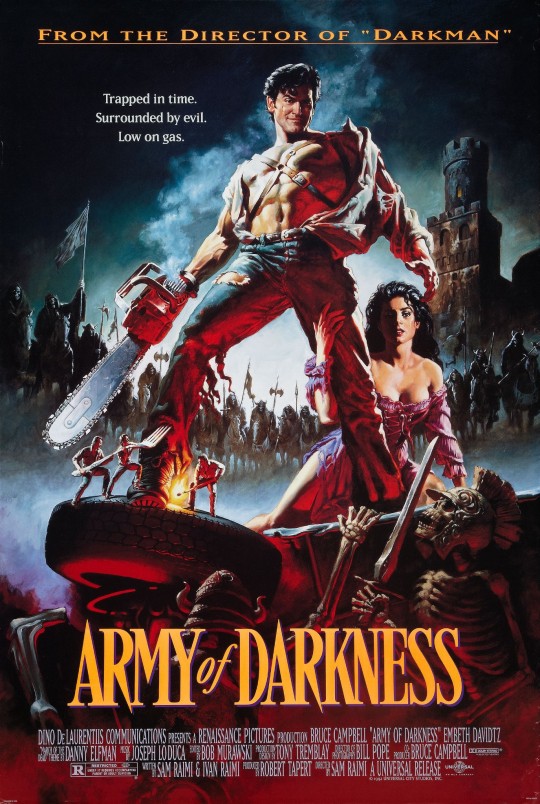
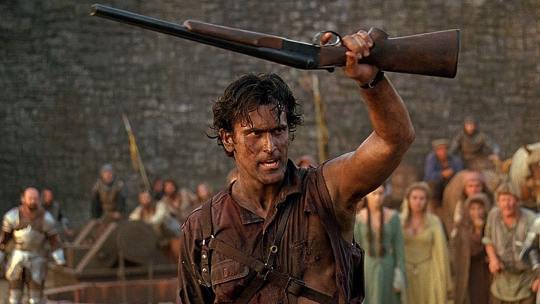
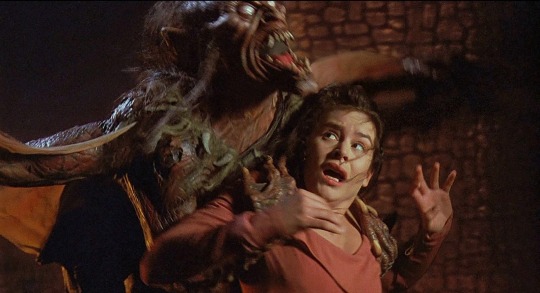
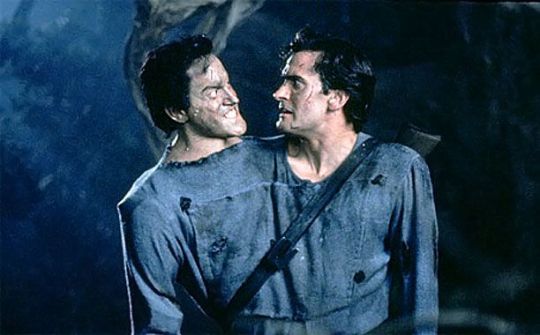
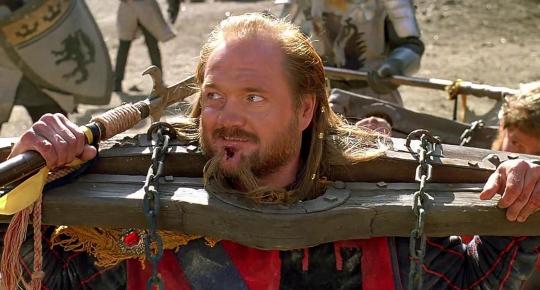
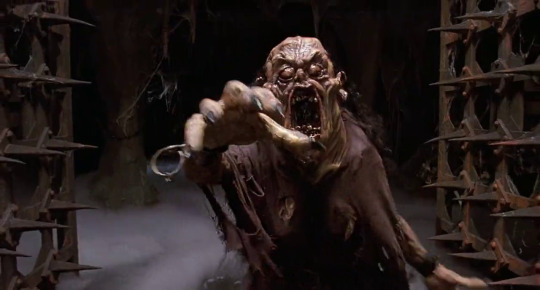
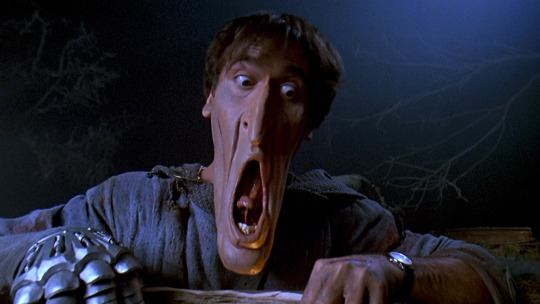
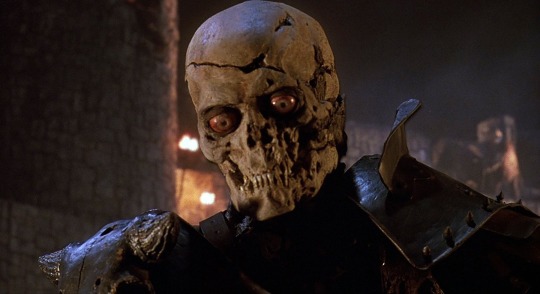
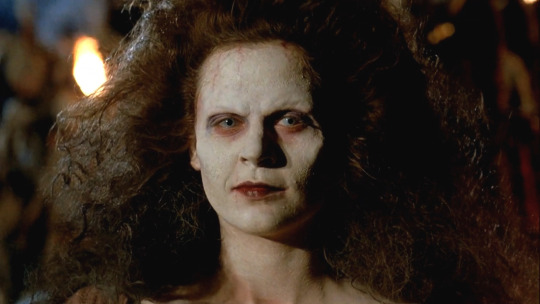
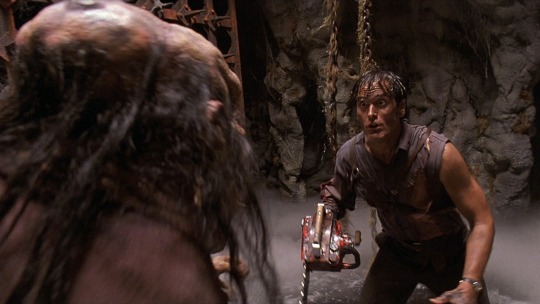
Army of Darkness (1992)
"Are all men from the future loudmouthed braggarts?"
"Nope. Just me, baby. Just me."
#army of darkness#evil deadology#horror imagery#horror film#1992#american cinema#sam raimi#ivan raimi#bruce campbell#embeth davidtz#marcus gilbert#ian abercrombie#richard grove#timothy patrick quill#bridget fonda#patricia tallman#michael earl reid#ted raimi#bill moseley#joseph loduca#danny elfman#i get why this is as beloved as it is but regretfully i think it's my least favourite of the og trilogy; i still had a whale of a time but#where fhe first film was a stripped down pared back bone chiller of an exercise in pure horror and the second built on that to stir in some#deeply funny absurdist black comedy‚ this one kind of foregoes the horror all together to concentrate on being a zany comedy film about a#fish out of water. ok so it's still quite gloopy in places‚ but the sense of dread‚ the palpable horror is gone. Campbell is still superb#of course and Ash is still very baby girl. but he and Raimi are mostly going for straight laughs instead of uncomfortable giggles#the laughing scene in ED2 is the perfect Moment of these films: an absolute nailing of the blend of disturbing uncanny with absurd ott goof#i missed that blend a little. still a great time like i say and still a worthy third film in an unlikely triumph of an indie trilogy
9 notes
·
View notes
Text
it's like i know what my therapy book was saying with "people like taylor swift telling you to follow your dreams is like a lottery winner telling you to just liquidate all your assets to get rich", but like.....i mean what else do you want her to say?? "too bad you'll never be like me no matter how hard you try in life bc i won the genetic lottery!" do you want her to behave like elon fucking musk???? like bezos???? do we really need more celebrities to behave like them??
#like there are so many genuinely shitty celebrities the author just had to pick taylor#the author frequently mentioned tumblr#and the book as a whole was just a professional ''laziness is a puritanical myth'' presentation#but that specific jab made me say ''yeah a tumblr user with a psych phd absolutely wrote this'' lmao#it was genuinely a good book overall but this one little moment miffed me kldjfhldjk#learning that the quote that's like ''the only thing necessary for evil to triumph is for good men to do nothing'' is not a real quote#was helpful for me seeing as it's one i've used to beat myself up with for years#talking tag
1 note
·
View note
Text
Pick One: Magical Girl Show or Rom-com. You cannot be both.
Early in season four we get the episode Gang of Secrets. An episode that ends with Marinette outing her secret identity to Alya. A touching moment that sparked outrage across the fandom because it meant that Marinette had made the choice to reveal her identity to her best friend while keeping her hero partner in the dark.
This choice spat in the face of the exceptions that many fans had for the series. Thousands of pre-season-four fanfics feature moments where Ladybug and Chat Noir promise each other that they'll be the first to know each other's identities. After the Alya reveal, scores of fanfics were written to salt on Marinette's choice to tell the "wrong" person.
Most of these fics feature a betrayed Chat Noir quitting or otherwise punishing Ladybug for breaking their promise to be each other's first, thereby destroying his faith in their partnership. But that promise was never made on screen. It only existed in the realms of fanfic and, when Chat Noir finally found out in canon, his reaction was largely neutral. He never once blamed Ladybug for her choice or pushed for a reveal or even asked for the right to tell one of his friends.
So what happened here? Why did the fans have such wildly unrealistic expectations of canon? Were their expectations even unrealistic or did canon betray them? The answer to that is not as straight forward as you might think because it all comes back to one of Miraculous' many, many, many writing problems: Miraculous is trying to be both a Magical Girl Show and a romantic comedy, but those are not genres that mesh. You can only be one (or you can be a third thing that we'll get to at the end as it's the easiest way to fix this mess, but I want to mostly focus on where the anger is coming from and why the writing is to blame.)
To discuss this mismatch, we're going to do something that breaks my heart and talk about some of Origins flaws. While I love that episode and unironically refer to it as the best writing the show ever gave us, it's not perfect and its flaws are all focused around trying to set up both genres. Do note that I'm going to use a lot of gender binary language here as magical girl shows have a strong focus on gender segregation and rarely if ever acknowledge gender diversity.
Let's Talk Magical Girls
Magical girl shows are shows that center on young women and their friendships. While male love interests are often present in these shows, the boys tend to take a backseat and function primarily as arm candy while the girls save the day and carry the narrative.
A great example of this is the show Winx Club. This show features a large cast of teenage girls who save the magical universe from various threats with their magical powers. Each girl has a love interest, but the boys are usually off doing their own thing and only occasionally show up for a date or to give the girls a ride on their cool bikes or magical spaceship. I don't even think that we see the guys fight or, if we do, it's a rare thing. They are not there to save the day. They are there to be shipping fodder.
Like most magical girl shows, Winx Club starts with the main character making friends with one of the girls who will eventually become part of her magical girl squad. This brings us back to Miraculous.
Did you ever find it weird that Origins implies that Marinette has no friends? She doesn't even have a backbone until new girl Alya shows up to become Marinette's First Real Friend:
Marinette: I so wish I can handle Chloé the way you do.
Alya: You mean the way Majestia does it. She says all that is necessary for the triumph of evil is that good people do nothing. (pointing at Chloé) Well, that girl over there is evil, and we are the good people. We can't let her get away with it.
This is a bizarre opening because Miraculous is not about Marinette making friends or learning to stand up for herself. If you skipped Origins and just watched the rest of the show, then you'd have no clue that Marinette wasn't close with her classmates before this year. You also wouldn't know that Alya was new in town and you definitely wouldn't know that Marinette had never stood up to Chloé before this year. So why is this here? Why waste screen time setting up elements that aren't actually important to canon?
Miraculous did it for the same reason that Winx Club did it: magical girl shows traditionally start with the main character making friends with at least one of her eventual female teammates because Magical Girl shows are all about the girls and their relationships. The boys are just arm candy.
But Miraculous isn't a magical girl show. The writers have explicitly stated that it's a rom-com and romantic comedies aren't about female friendship. They might have female friendships in them, but that's not where the focus is. The focus of a rom-com is on the romance and Origins is very clearly all about the romance.
Origins as a Rom-com
Origins has a lot on its plate. It has to establish the villain's motivation for the first time, show us how the heroes got their miraculous, show us how the heroes first met on both sides of the mask, show us how they met their respective best friends, and show us how the heroes dealt with their first akuma. It would be perfectly understandable if this 40 minute two-parter didn't do anything with the romance. They have a full show to give us that!
In spite of this, Origins has some incredibly touching moments for both Ladynoir and Adrienette because romance is the heart of Miraculous. It is the main focus of the show. The driving motivation for both of our leads and the majority of the show's episodes. To tell the story of how their journey started without at least one of them falling in love would feel wrong. That's why we see both of them fall in love!
First we get Chat Noir giving his heart to his bold and brilliant lady, then we get Marinette's heart being stolen by the shy sweet boy who never once thought to blame her for her snap judgement of his character. We even get a touching moment where Chat Noir inspires his lady to accept her role and be Ladybug, leading her to boldly face their enemy and call him out:
Roger: I have a new plan, unlike you! Move aside and let the pros do their thing. You've already failed once!
Ladybug: …He's right, you know. If I'd captured Stoneheart's akuma the first time around, none of this would have happened! I knew I wasn't the right one for this job…
Cat Noir: No. He's wrong, because without you, she'd no longer be here. (they look at Chloe) And because without us, they won't make it, and we'll prove that to 'em. Trust me on this. Okay?
Ladybug: Okay.
I love this moment, but it does lose a little of its power when you remember that we had an Alya-driven variation of this exact same thing five minutes prior:
Alya: HELP!!
(Marinette suddenly gets filled with courage. She gets the case out of Alya's bag and puts on the Miraculous. Then, Tikki appears, happy to see Marinette again.)
Tikki:(raising her arms) Mmmm!
Marinette: I think I need Ladybug!
Tikki: I knew you'd come around!
Marinette: Well, I'm still not sure I'm up for this, but Alya's in danger. I can't sit back and do nothing.
This scene initially confused me because - if Miraculous is a rom-com - then why would you make Alya the reason that Marinette became Ladybug? Why wouldn't you have Chat Noir be the one in danger so that Marinette chose to fight because of her love interest and then encourage that bond with the later scene of him encouraging her? Why split the focus like this? Why give Alya so much attention?
In case you haven't figured it out, it's because Origins is trying to establish two different genres of show. Two genres that will continue to fight for the rest of the series (or at least the first five seasons).
Magical Girls Vs Rom-com
Why is Alya the one to shake off the nightmare dust and inspire the others during the season five finale? Why is Alya the one that Marinette trusts with all of her plans while Chat Noir is kept in the dark? Why does Alya and Marinette's friendship get so much more focus than Adrien and Nino's? Why was Alya the only temp hero who got upgraded to full time hero?
It's because Alya is Marinette's second in command in a magical girl show and magical girl shows focus on female friendships while the boys are just there to be cute and support the girls.
Why do most of Marinette's talks with Alya focus on Adrien? Why is Chat Noir the only other full time holder of a Miraculous for the first three seasons and then again for the final season? Why do Marinette's friends become more and more obsessed with Adrienentte as the show goes on? Why is the love square's identity reveal given so much more narrative weight than any other identity reveal?
It's because Miraculous is a rom-com and the love square is our end game couple, so of course the story focuses on their relationship above all else!
Are you starting to see the problem?
Circling back to our original question: no, it was not unreasonable for the fans to expect that the Alya reveal would have massive negative consequences for Ladynoir. That is what should happen in a rom-com and Miraculous is mainly written like a rom-com. But the writers are also trying to write a magical girl show and, in a magical girl show, Alya and Marinette's friendship should be the most important relationship in the show, so it makes perfect sense that the show treats the Alya reveal as perfectly fine because the Alya reveal was written from the magical girl show perspective.
When it comes to Miraculous, if you ever feel like a writing choice makes no sense for genre A, re-frame it as a thing from genre B and it suddenly makes perfect sense which is fascinatingly terrible writing! It's no wonder there are people who hate the Alya reveal and people who will defend it with their life. It all depends on which genre elements you've picked up on and clung to. Neither side is right, they've both been set up to have perfectly valid expectations. Whether those expectations are valid for a given episode is entirely up to the mercurial whims of the writers!
How Do We Fix This Mess
At this point, I don't think that we can, the show is too far gone, but if someone gave me the power to change one element of Miraculous, that element would be this: scrap both the magical girl stuff and the rom-com stuff and turn Miraculous into a team show where the friendships transcend gender.
At this point, I've written over a quarter of a million words of fanfic focused on these characters (the brain rot is real) and one thing I've discovered is that it is damn near impossible to keep Adrien and Alya from becoming friends. They're both new to their school while Marinette and Nino have gone to the same school for at least a few years. Alya and Adrien are both obsessed with Ladybug plus Adrien is a natural hype man who loves to support his friends and Alya loves to talk about her blog. Alya is dating Adrien's best friend. On top of that, Alya, Adrien, Nino, and Marinette are all in the same class, meaning that they pretty much have to be spending time together five days a week unless French school don't give kids a chance to socialize or do group projects. If so, then judging them for the first issue, but super jealous of the latter.
Given all of that, why in the world is does it feel like Alya is Marinette's close friend while Adrien is just some guy who goes to Alya's school? Along similar lines, while canon Marinette barely talks to Nino, I've found that Marinette and Nino tend to get along smashingly, especially if you embrace the fact that they have to have known each other for at least a few years.
If you embrace this wider friendship dynamic and scrap the girl squad, replacing it with Alya, Adrien, Marinette, and Nino, then the fight for narrative importance quickly goes away. It's no longer a question of is this episode trying to be a magical girl show or a rom-com? Instead, the question is: which element of the friend group is getting focused on today? The romance or the friendship?
A lot of hero shows do this and do it well. I think that one of the most well known examples is Teen Titans. That show has five main characters and the focus is usually on their friendships, but there is a very clear running romantic tension between the characters Robin and Starfire with several episodes giving a good deal of focus to their romance. I'd say that this element really starts in the show's the 19th episode - Date with Destiny - and it all culminates in the movie that capstones the series: Trouble in Tokyo. The character Beast Boy also gets a romance arc and, while it's more short lived, it's further evidence that you can have strong romances and strong friendships in the same show and even the same episode. You just have to own the fact that boys and girls can be friends with each other, a very logical thing to embrace when your show has decided to have a diverse cast of heroes instead of imposing arbitrary gender limitations on its magical powers.
I couldn't figure out a way to work this into the main essay, but it's relevant so I wanted to quickly point it out and give you more to think about re Origins. Have you ever found it weird how Origins gives both Adrien AND Marinette the "I've never had friends before" backstory and yet wider canon acts like Marinette has this strong amazing friend group while Adrien doesn't seem to care about making friends and instead focuses all his energy on romance? Why give both the protagonist and the supposed deuteragonist this kind of origin if it's not going to be a major element of the show? It makes so much more sense to only give one of them this backstory and then focus that person's character arc on learning about friendship.
#ml writing critical#ml writing salt#adrien deserves better#marinette deserves better#alya deserves better#nino deserves better#My queendom for a team show#I was promised a team show!#Why even give the boys powers if you don't want the boys to have screentime?
884 notes
·
View notes
Note
hi, i hope you dont mind me asking this question! i often come across lists of reading recommendations for communists, and they are usually focused entirely on communist theory. which is important and im already on that, but i wonder if you also have recs for learning about history? especially the history of the soviet union, but also other past and present socialist states. i sometimes find myself reading theory and understanding the concepts in a vacuum, but with very little understanding of the historical context they were written in, if that makes any sense. and id like to get a basic grasp of the history of various socialist projects that isnt just the typical western "the ussr was evil!!!!" thing
Hi, historical context is indeed very important for works of theory, especially if it's more than a hundred years old. Lenin's What is to be Done, for example, is very conditioned by its historical context of Russia still being predominantly feudal, with only a timid appearance of the proletariat in St. Petersburg and Moscow, and therefore the very first trade unions, which he talks about. The understanding of these texts is amplified, and quite often enabled by knowing at least the basic historical context. Below I'll list the historical works I've read (and others) with some commentary, but I encourage anyone who has something to add to do so, since I am as of only recently getting more into historiography.
Anything by Anna Louise Strong (I've read The Soviets Expected it (1941) and In North Korea (1941), there's also The New Lithuania (1941), The Stalin Era (1956) and When Serfs Stood Up in Tibet (1959) for example). Her works, which I'd consider primary sources since they are written from her own experience witnessing events and talking to a lot of people, are extremely useful if you wish to form an idea about how some aspects of socialist states worked. The limitation of her works also resides in this specificity and closeness, these are not works that present a broad view of long processes, but a slice of the present with the sufficient historical context. They are still very, very good.
The Open Veins of Latin America (Spanish versrion), by Eduardo Galeno (1971). This one is focused on the history of imperialism in Latin America, how it evolved from the moment the first Spanish foot touched ground to the time it was written in (It talks about Allende before he was assassinated but after achieving power, for example). Perhaps it's not exactly what you're looking for, but it contains very important general context for any social movement that has happened since 1492 to 1971
The Triumph of Evil, by Austin Murphy (2002). I have mixed feelings about this book. While it insists on this weird narrative of absolute evil, which IMO takes away a lot of value from the overall points made, it is an astonishingly in-depth analysis of the economic performance and general merit of socialist systems against their capitalist counterparts. Most of the book is dedicated to comparing the GDR to the FRG, and both the economic and social data it exposes was very eye-opening to me when I read it about 2 years ago. If you can wade through the moralism (especially the beginning of the introduction), it's a gem. I've posted pictures of its very detailed index under the cut :)
Blackshirts and Reds, Michael Parenti (1997). Despite the very real criticisms levied against this book, like its mischaracterization of China, it is still a landmark work. Synthetically, it exposes the relationship between fascism, capitalism and communism.
Red Star Over the Third World, Vijay Prashad (2019); The Russian Revolution: A View from the Third World, Walter Rodney (2018). I'm lumping these two together (full disclosure, as of writing I'm about four fifths of the way through RSOtTW) because they deal with the same topic, Prashad being influenced by Rodney as well. Like both titles imply, they deal with the effects the October revolution had on the exploited peoples of the world, which is a perspective that's often lost. Through this, they (at least Prashad) also talk about the early USSR and how it functioned. For example, up until reading Red Star, I hadn't even heard of the 1920 Congress of The Toilers of the East in Baku, or the Congress of the Women of the East.
From here on I'll link works that I haven't (yet) read, but I have seen enough trusted people talk about them to include them
How to Cast a God into Hell: The Khrushchev Report, by Domenico Losurdo (2008). This one talks about how the period of Stalin was twisted and exaggerated through destalinization.
Devils in Amber, by Philips Bonoski (1992). This is about the Baltics and their historical trajectory from before WW1 to the destruction of the USSR (I'm not very sure on those two limits, perhaps they fluctuate a bit, but it definitely covers from WW1 to the 60s)
Socialism Betrayed, by Roger Keeran and Thomas Kenny (2004). This one deals with the process leading up to and the destruction of the USSR itself.
The Jakarta Method, Vincent Bevins (2020). This is about the methods the US used in the second half of the 20th century to stamp out, prevent, or otherwise sabotage communist movements and other democratic anti-imperialist movements.
I know some of these aren't specifically about socialist states, which is what you asked, but the history of its opposition is just as important to understand because it always exists as a condition to these countries' development and policies chosen.



385 notes
·
View notes
Text
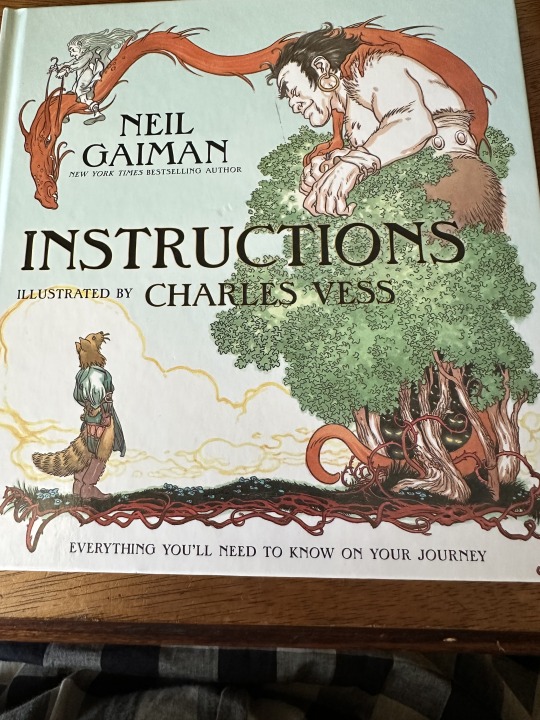
Navigating Betrayal: Reconciling Admiration with Disillusionment
Like many Neil Gaiman fans this month, I've been shocked and distressed by the news regarding the SA allegations. I won't go over the details, as they're readily available online. I'll start by saying that I believe the accusers, and even the most lenient interpretation of events is still troubling enough to discredit Gaiman. For a long time, I didn't know what to say. I was just shocked and, somewhat naively, felt betrayed. I don't typically idolize actors, authors, or other public figures—I'm here for the characters, they're who I love and believe in. So, how did I end up believing in this man and his rhetoric?
I only had a parasocial relationship with him, which is to say no real relationship at all. But I took his Masterclass on writing, spent hours taking notes, and learned from him. I feel betrayed by someone I saw as a beloved teacher. I know this is insignificant compared to what the women who came forward experienced, but it's a valid feeling, and I needed time to process it. My initial reaction was to throw out and discount everything he’s ever written or done—of course it was.
This isn't just about my love for Good Omens, although how can it not be? I learned so much from this man—about writing, about not being too hard on myself, about the creative process. I read his books to my middle school classes, and we all learned how to be better people from them. Today, I saw and bought Instructions, a children’s book by Neil Gaiman illustrated by Charles Vess, from the used bookstore where I volunteer. It was a used copy, so no royalties will go to him. It’s a beautifully illustrated book where the main character walks through a land that clearly symbolizes life, learning lessons like saying please and "if any creature cries to you that it hurts, if you can, ease its pain." How could someone write this and then do what he did? I asked myself. "What an evil hypocrite," was my first thought. But then I recalled a line from another author, Stephen King. In The Stand, a character is described as "awake at the lectern, but asleep at the switch," meaning they know the right thing to do and can talk about it, but in the moment of choice, they act without integrity.
I don’t know if I’m making sense, but I think it’s too easy to label Gaiman as simply evil, as if he intentionally manipulated us by saying the right things just to make us read or watch his creations. The reality is likely far more complicated. Within this man is the amazing, thought-provoking, life-affirming wisdom that many of us have tried to live by, but also the hard, thoughtless, selfish cruelty that led him to abuse young, vulnerable women. The wisdom does not justify the abuse, and the abuse does not nullify the wisdom.
I think it's too simplistic to say Gaiman is despicable and always has been, hiding it from us all along. This doesn't acknowledge the complexity of human nature—that there is potential for both good and bad within us all. As it’s said, possibly by Terry Pratchett or possibly by Neil Gaiman, “It may help to understand human affairs to be clear that most of the great triumphs and tragedies of history are caused, not by people being fundamentally good or fundamentally bad, but by people being fundamentally people.”
Gaiman is a man who has done some fundamentally good things and some fundamentally bad things. I can’t forget either one.
This is just my opinion. I know some people want to cancel him, while others want to exonerate him. You do you. As for me, I will continue to love Aziraphale and Crowley. I will continue to read and create fan-fiction. I will continue to find comfort and wisdom in books that have meant so much to me over the years. But I will also remember that they were created by a very flawed man whom I can no longer trust.
I understand that opinions on this matter vary widely. I know some people might feel that not discarding everything associated with him is wrong, but this is where I stand. I’m not looking to debate this or be told how I should react. I just needed to process my thoughts in writing and move forward in the way that feels right for me.
380 notes
·
View notes
Text
There's a specific genre of shitty antisemitic joke that I have seen fly under the radar (as it was designed to) a LOT more often lately - especially since Kanye started going full mask-off nazi - so I feel the need to issue a warning about it. Namely, the genre is jokes that get spread around by people who aren't willfully antisemitic because outside of conspiracy brain rot land, it appears that the point of the joke is absurdism.
As an example, let's examine the 23-and-me lizard DNA test that I've sadly seen floating around unquestioned.
Because, see, to the average person who isn't willfully antisemitic, this genre of joke comes off as nonsequiturs, or hilarious mistakes - you, as a person with some level of basic observational and critical thinking skills, living on Earth and not in whatever batshit mirror dimension conspiracy theorists think we live in, might very well end up getting a giggle out of it because, HAH, we KNEW those DNA ancestry kits were a scam! If you're not a deliberate antisemite but not really up on the dogwhistles, it doesn't scan as anything awful because you're put in mind of things like feeding a photo of something decidedly not human into that one selfie-to-anime neural net, which sometimes works and produces interesting results because the thing is looking for specific patterns and trying to make anything fit - not things like blatantly lying about doing something like that in the hopes that normies who see the absurdity and want to have a laugh at a scummy company's expense will pass it along to people who unironically believe that Jewish people are actual literal lizard aliens and the test proves it.
This is the same strategy that guy at the game awards pulled. You, a person living in reality where the main source of political corruption is just the basic consequence of an economic system that makes power pool in the hands of anyone willing to exploit enough people, a world of banal mundane evil, know damned well that QAnon-pizzagate-satanic ritual abuse cult conspiracy bullshit is, well, bullshit, if you're even familiar with the details of what they believe at all. When someone crashes the stage and thanks Rabbi Bill Clinton, you may very well laugh because to YOU it is a blatant absurd nonsequitur.
Problem is that to someone else, someone who's deep into that shit, it's either someone letting the truth slip, or someone backing the deep state into a corner - whichever is more convenient to believe.
This is one form of how the far right uses memeification (CW: the example discussed in the link is a rape "joke") - it means something totally different to the in-group than it does to the out-group. To you, it's funny because it's nonsensical; to them, it's fun because they think they're onto something huge and they're about to blow this shit wide open and it's going to be their great moment of triumph.
I cannot stress enough that no matter how absurd an antisemitic conspiracy theory sounds to you, there are people who believe it, unironically. There are people who unironically believe that Jewish people are very literally not human and no amount of evidence to the contrary will ever change their minds. There are people who believe that we're born with horns and tails and pointed ears and have them surgically altered to fit in with good Christian humans like some kind of extremely high-stakes game of Among Us. There are people who believe that we steal, ritualistically abuse, and kill Christian babies. These beliefs, while fringe enough that, yeah, most of you who this post is aimed at have never heard them in the wild before very recently, are not nearly as fringe as you probably think they are. Just look at fucking Kanye. This asshole has more fans than there are Jewish people in the world.
So I'm begging you to please, bare minimum, be careful of "absurdist" jokes about Jewish people, especially if they reference lizards, money, banking, or government power. Also, you may see Jewish people debating how religious laws may apply to fictional creatures, but outside of that context you should also be wary of any time Jewish people are mentioned in the same sentence as vampires, dragons, goblins, zombies, fantasy demons, or any number of other fantasy creatures known for greed, feeding on humans, or both.
If the reason it seems funny to you is because you'd have to be really stupid to believe it's true or makes any kind of sense - it's probably looking for you to spread it to people who are, in fact, that stupid.
4K notes
·
View notes
Text
"It's so silly, why is Carlos scared of dogs?"
"What's going on with the whole staring contest thing with Mal and Maleficent, it's so lame"
Because these are both details on how each of these mothers control their children! Same with the Evil Queen convincing Evie that her only worth was in beauty and who she married and why Jafar made Jay steal consistently!
I know the second and third movies really gloss over it horrendously but D1 was very much about abused children escaping their parents and each of the four parents has a different method of "control" over their child.
Maleficent's staring contest is "you will never be as powerful as me unless you do as I say," (aided in part because at this point in canon, Mal's dad was human), so Mal finally "winning" a staring contest was her beating her mother through refusing to give in, and thus Mal's spell triumphed.
Cruella teaching Carlos to be scared of dogs is "the world is too frightening and dangerous and you must stay here," but befriending Dude is the moment he realizes she is absolutely wrong about the world and he would much rather be surrounded by friends than live in fear.
Jafar making Jay steal is because there's no magic and wealth is now the only semblance of power that can be found on the island but also isolation because you can't trust anyone - until Jay wins the MVP trophy and realizes that trusting his friends makes a great difference.
And the EQ reducing Evie's worth to beauty not only references the whole "Fairest of Them All" thing but also magic/knowledge was not a guarantee of power, but 'beauty' was what mattered most and why Snow White survived being poisoned; and yet that fails Evie because Chad is the worst but the one person who encourages her no matter what is the son of a dwarf.
#like yes on their own the details might seem silly but it's the PATTERN that they're a part of that matters so much!#disney descendants#descendants#anyways i still fume about how d2 tried to make it 'these abused children escaping abuse are traitors! how dare they leave us'#especially from uma of all people who is the most outspoken voice about how purely terrible the island is#and then d3 tried to go 'no the parents are fine lol! the four run back to them to see them! it's all fine'
120 notes
·
View notes
Text
yknow a take on morgana pendragon's story i see often is that if merlin had told morgana about his magic in that moment where they were in his chambers alone that she wouldn't have turned to become evil,, i disagree,, i think that morgana as a character would have eventually turned to become evil and bitter even with merlin as a mentor if she'd learned his secret early in season 2.
let's not forget merlin himself is NOT the most stable of mentor options (not that gaius or kilgahrah or ANY of the druids were a great help either) but he didn't know what the fuck he was doing,, just trying his best consulting that outdated spell book and had cryptic messages from a conniving dragon who MIND YOU still wanted morgana dead and was manipulating merlin the whole time and gaius was a traitor to most magic people like,, he literally was pro-gaslight morgana
merlin also loved arthur, however you view that love (romantic, platonic, brotherly, whatever) merlin loved arthur more than he did magic. we see this multiple times with merlin choosing what kept arthur safe and happy over him doing what would be best for the old religion (fuck them too but that's another post),, major example being the episode with the disir where he straight up tells him there is no place for magic in camelot (which is crazy considering he IS magic made flesh but anyways)
morgana HATED. uther, she hated everything about him and for awhile she disgusted that hate as righteous fury, raining down terror and pain onto innocents (even other magic users) and justifying it as payback. she hated arthur as an extension of uther because that's what uther raised them both as (again another post for another time) and tried to kill him without even asking what his stance was on magic (i believe arthur would have immediately done some introspection and realized he was wrong but thats imo)
i think that eventually,, their two stances would have come to blows (merlin's love for arthur above his magic/morgana's hatred for uther above all else) and morgana would still go to immeasurable heights to murder uther once more, merlin would have stopped her (or tried) because he knew the pain it would cause arthur even if he hated uther too, and morgana would've hated merlin for getting in her way,, her anger triumphing her love for arthur (see: s1ep12: to kill the king)
i feel like often times i just see morgana painted as someone who just needed a little love and light,, when in reality she's been heavily abused and pit against arthur since she was like 10/11 (however old she came to Camelot) and is now a grown woman who is realizing she hates her abuser and everything he's done and wants to destroy him and everything he loves !!
likewise merlin was manipulated and gaslit and forced to become a compulsive liar and would've NOT !! been good for morgana and eventually everything would've gone to shit !!
they are worsties for better or much much worse
#bbc merlin#some guy talking#merlin#arthur pendragon#morgana pendragon#the worsties#merthur#let women be evil#stop trying to paint them as justified meow meows#she is sinister and that is important to me !!#mergana fiendship#merlin meta
737 notes
·
View notes
Text
Spock's World Inspired Holiday Card circa 1992
December 1992. Spock's World was among my favorite novels. I had just turned 19 years old that month. In keeping with the tradition of making holiday cards, that year I drew artwork inspired by a scene in Spock's World, the Star Trek novel by Diane Duane.
No computer. No printer. This was 1992. I drew it in pencil and darkened it with ink. The message was all hand lettered. My dad made copies of the artwork at his office. Each copy was colored by hand with colored pencils and crayons.
The image centers on the IDIC symbol, Infinite Diversity in Infinite Combination, a concept central to Vulcan philosophy. Diane Duane wrote the most beautiful passage in Spock's World that simply explained the meaning of IDIC. I copied the passage for the message inside the card. The IDIC symbol was surrounded by animals, plants, and other organisms representing the biodiversity of Earth.
The passage from Spock's World was from a scene where Surak was in the desert and saw the giant sandworm-like creature, referred to as the Underlier (called A'kweth or Tcha'besheh). Both beings paused and beheld one another, the Underlier and the Vulcan, in the vast desert under the light of T'Khut (called The Watcher), Vulcan's sister planet.
"How delightful to be so different from something. No need to understand them, particularly; that might come with time and would be an added delight. But it was enough to accept their difference, to celebrate just that without anything added. Creation, in itself, was joy, the difference was joy, the celebration of it was joy."
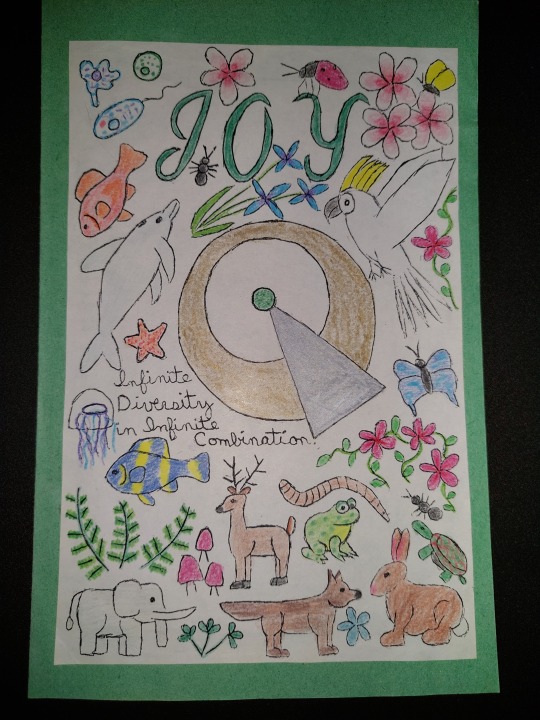
Front of card. Star Trek inspired greeting card artwork. Based on the novel Spock's World. Image features the Vulcan IDIC symbol and cartoon drawings of animals representing diversity. Created in 1992.
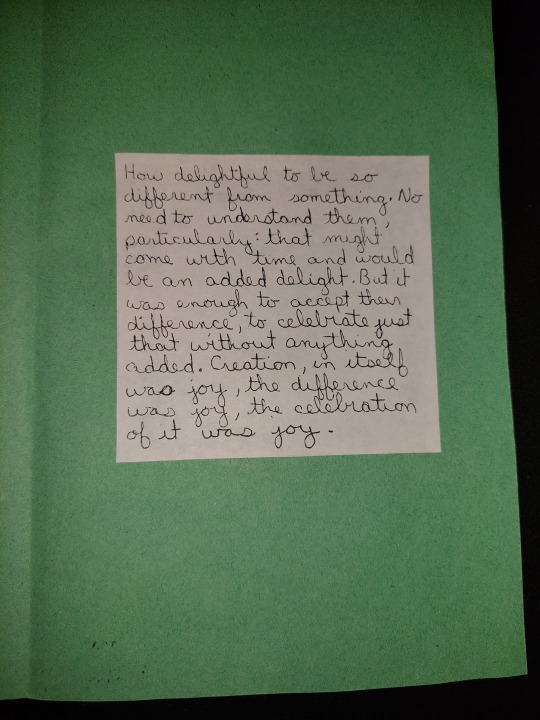
Inside of card. Star Trek inspired greeting card artwork. Based on the novel Spock's World. Image features a quotation from the novel representing diversity and the IDIC philosophy. Created in 1992.

Front and back of card. Star Trek inspired greeting card artwork. Based on the novel Spock's World. Image features the Vulcan IDIC symbol and cartoon drawings of animals representing diversity. Created in 1992. (Copyright Myers Cards 1992.)
The passage in the novel continued:
"There was nothing that could stand against that joy: sooner or later it would triumph. All evil, all death, was a tiny, fretting, posturing thing that knew its own defeat was coming, and it might rage and destroy as it liked. It was doomed. Celebration would win, was winning, had won now. Everything was one moment, and the moment was nothing but triumph and joy."
This resonated with my 18/19 year old self. This still resonates with me today. Oh, my heart! I cry for joy! Such beautiful ideas and words to live by!
Regretfully, I didn't credit the author on the card at the time. I assumed friends and family wouldn't care. It was yet another weird, cheap, homemade holiday card from their weirdo sister / niece / daughter / student / friend.
I hope you enjoy the amateur artwork and Diane Duane's message. Enjoy the diversity and differences. Embrace and embody IDIC.
Thank you, @dduane.
Peace and long life,
Amy
379 notes
·
View notes
Text
To Build Something Else

Whenever I read a fanfiction that takes place in the future where the hero kids continue their schooling as normal and emerge as pro heroes into the existing system, I always kinda view it as like, “AU where things weren’t as bad” or “AU where everyone is still pretending that this is the way things should be” or “AU where good and evil are morally uncomplicated.” I’m not trying to call anybody out—I’ll still read and enjoy these sometimes—but that’s how I’ve always looked at it. I’m starting to notice other people feeling it too. I’ve read fics where they point out how redundant and unfair it is to go back to being students after saving the world (remember how many pros straight up quit and left a bunch of kids to keep fighting?). I’ve seen people acknowledge how trauma will affect their ability to keep going. Perhaps the trickiest thing to wrap our heads around is how the villains will fit into it all if not through death, punishment, or imprisonment. What about all the other trappings of society? The heavily regulated quirk use, the government-funded pros aiding police control and contributing to cover-ups that maintain the illusion of peace. Hero idolization, quirk counseling, civilian helplessness. Judging a person’s worth or character based on their quirk…
It would sound too obvious and cheesy to simply point out that society isn’t “just the way things are,” that change is possible. We all know this, and yet we struggle to pinpoint exactly where to aim our sights, find the source, make any meaningful progress. The other day I read some articles from my university’s student newspaper around 1970, and it made me feel sick wondering if progress is really an illusion. Fact is, it’s easy to intellectually deconstruct society, but very difficult to imagine how to build something else.
In this fictional world, heroes have offered a mythical vision of safety and triumph. When All Might arrived, everything was going to be okay. But let’s not forget how this story began: with a moment where All Might paused, like a bystander, and in his place, a desperate civilian kid hurtled forward without any common sense. If you ask me, it wasn’t that Izuku was so good and pure and selfless, it was that he disregarded everything.
And so the person who “saves the world” (if we can even reduce it to such a concept) is not the person who puts everyone at ease and makes crowds cheer. It’s the person who makes everyone hold their breath, with a feeling in the air like the pressure changed, and it smells like rain. It is natural to be worried about the future. It’s honest. It means you can see what’s really going on. Hero society has never felt this exposed, but the people are held back from the edge of despair because there is also so much potential brewing. Electricity about to strike. The world will NOT go back to the way it was, no matter what. That much is certain. But what if we still live to see the dawn? What then? What if one person’s courage to break the mold makes all the difference?
I’m not just talking about Izuku, you know. I’m talking about Horikoshi.
To an extent, I’ve given up on predicting how exactly things will play out, because if nothing else, I can tell he’s planning something big—so big, I can’t quite picture it. I’m watching and waiting for the one person who can. I just know where he’s coming from. I think about how he’s never come this far before because his other stories were snuffed out. I know he used to struggle to see the future of his career. I relate to his stubbornly rebellious resolve to do what he wants anyway. To keep dreaming. I know that emotional sincerity is his specialty. And now he’s even directly breaking the fourth wall, having characters talk about what’s supposed to happen in comic books. Gradually, almost imperceptibly at first, we’ve been shown how something else can happen. He’s not done yet.
#listening to bastille's give me the future album again and feeling things#bnha 416#bnha 417#bnha manga#mha#boku no hero academia#my hero academia#midoriya izuku#all might#bnha meta#lin speaks#bakudeku#dekubaku#bkdk#dkbk
232 notes
·
View notes
Text
drives me nuts when people treat jin guangyao or wei wuxian like they're socialist revolutionaries like no! they're not!! in fact their respective roles in society and complacency regarding its hierarchies is why ANY of the story even happens to begin with!!!
jin guangyao doesn't hold bitterness just because he was born lower class. he is bitter because others deride him and his prostitute mother in spite of both their intelligence, skills, and efforts to climb the ladder.
why do you think we were shown scenes of other prostitutes in the brothel deriding meng shi for being literate, for "trying" so hard? why do you think we were shown scenes of anxin taunting meng yao and throwing shit at him because he was trying to learn cultivation at his mother's behest?
why do you think jin guangyao arranged for the arson of that brothel, burned to the ground with everyone except sisi inside? that's not the behavior of someone who believes in true equality and the inherent worth of sex workers as human beings!
that's the behavior of someone who thinks he's better than them. the behavior of a man who already came up on top through political games and war crimes, backstabbing and spying for the sake of the "greater good".
i won't rehash his argument to nie mingjue that he didn't have a choice-- he had some choice, but no matter what he does his class will come up and people will always assume the worst and try to hurt him for it, which forces his hand to do whatever will protect him best (hence 'no choice').
jin guangyao did everything he could to secure his own safety and a place among those already higher up. and by that point, he'd won it.
the fact that the temple rebuilt on the brothel site is to guanyin, the goddess of mercy, is even more ironic! the fact that jin guangyao has the goddess's statue carved to look like his own mother is proof that he viewed both her and himself as higher than them. more worthy than them.
of course he cared about the general welfare of others (read: the watchtowers). but consider also that there is no watchtower near yi city, which ended up being one of xue yang's playgrounds. jin guangyao can and will turn a blind eye to certain sufferings if it is convenient to him.
sure, jin guangyao made undeniable contributions to cultivation society and accessibility, but he is not at any point trying to topple existing class structures. his adherence to them is in fact integral to his own downfall in the end.
it brings with it the inevitability of society conveniently ignoring his triumphs and genuine moments of humanity to deride him once more as an evil, disgusting son of a whore once his crimes come to light.
now for wei wuxian. he's the righteous protagonist of the story and he doesn't give a fuck what society thinks, yes, but he wasn't out there trying to cause an uprising so that all the poor servant classes and lower could become cultivators. he wasn't trying to redistribute wealth or insinuate that those who are lower deserve to be viewed as equal to the gentry.
the most critical and non-explicitly stated fact of mo dao zu shi is that wei wuxian has always been resigned to his position in the social hierarchy.
his unreliable narration, especially regarding his own past and thoughts, is so damn important. he doesn't EVER tell the reader directly that people treated him any which way at their leisure because of his parents' differing social classes.
no. instead we are shown how much prestige he is afforded as cangse-sanren's son-- reputation as a talented and charming young cultivator, made head disciple of Yunmeng Jiang-- and how little respect he is given in the same breath, as the son of servant wei changze.
the way he is treated by others is as fickle as the wind. if he obeys and does as told, there is no reward. of course he did that, that was the expectation to start with! if he does anything even slightly inconvenient, there is a punishment. of course he has no manners, what else would you expect from an ungrateful son of a servant?
wei wuxian's righteousness is not a matter of adhering to principles he was explicitly taught, the way nie mingjue values honor or the way jiang cheng always tries to prove himself. wei wuxian does the right thing regardless of what the consequences are to him because his good deeds are always downplayed and his bad deeds are always singled out, no matter who or how many people were doing it with him.
he has faced this double standard since childhood. there are points in the novel where it's clear that this sticks out to wei wuxian, but does he ever fight back against that view of himself? does he EVER, at any point in the story, explain his actions and choices to jianghu society and try to debate or appeal to their sense of reason?
no. because he knows, at his very core, that any explicit deviation from their interests whatsoever will be punished.
slaughtering thousands of people is fine when they want him to do it, and when the alternative is unjust torture, re-education camps, and encroachment upon other sects' lands.
slaughtering thousands of people who are trying to paint him as evil for not going along with their genocidal plans, however, is punished.
wei wuxian knows his acceptance among the higher classes is superficial and unsteady. from the age of 10, when jiang fengmian took him in, he knew subconsciously that he could be kicked out at any time.
he knows that cultivation society doesn't care about war crimes and concentration camps and mistreatment of the remaining wen survivors of the sunshot campaign. but the right thing to do now that they aren't at wartime is to help them, plus they'd punish him either way for it, so he will.
in this regard wei wuxian is more self-aware of his position than jin guangyao. he does care about common people and he does try his best to help them as an individual. even if that ends up with him disabled, arrested, targeted in sieges, or dead.
but is he revolutionary? in the full equality, fight the establishment, rewrite laws, change social structures and people's perceptions of class sense?
no. no. he isn't.
now my knowledge of chinese society and history is fairly limited to my hindu diaspora upbringing and our shared cultural similarities ... but speaking to what i absolutely know us true, adherence to one's social class is expected.
this is rigid. efforts and merits might bring you some level of mobility, but in the end, the circumstances of your birth will always be scrutinized first, and your behavior compared to the stereotypes of where and how you originate.
mdzs is not about revolution, and none of its characters are able to truly change its society. there is no grand "maybe cutsleeves aren't inherently bad" or "i'm sorry for persecuting you and believing hearsay, you were truly a good person all along!" at the finale.
people ignore history and repeat it again with the next batch of ugly gossip and rumors.
wei wuxian, lan wangji, and luo qingyang find peace only by distancing themselves from cultivation society and its opinions.
jin guangyao and wei wuxian both cannot ever escape from others' perception of their origins and actions. regardless of their personal beliefs, they are not revolutionaries.
#keri chats#mdzs#mo dao zu shi#long post#mdzs spoilers#wei wuxian#jin guangyao#mdzs meta#the untamed#cql#i know it's funny or fanon to call them commies but it's so deeply fucking important to me that ppl understand they CANONICALLY are NOT#AAAAAAAAAAAAHHHHHHHHHHHHHHHH#this is messy and unedited and rather surface level but again if you read this post i love you lmao#wwx did the right thing in the xuanwu cave by helping mianmian and fighting back against wen chao BUT he was punished for it#through wang lingjiao's visit insisting he be whipped for it + the fall of lotus pier#like if wwx'll be punished either way ofc he'll do the righteous thing. but he is undeniably resigned to the fact that they won't change#wwx doesnt TRY to change THEM. he just does what he wants & believes is right himself#big difference & while jgy is often easy to clear up i still see so many people say that wwx is different and im like. YES but also GOD NO
153 notes
·
View notes
Text
Moc Weepe in 3x17 is pitiable and tragic, but Saskia is 10000% correct to read him his fucking rights lmao.

There are too many incredible moments to screencap them all but this is basically the thesis of Moc Weepe. He could choose to stop. The time is riper than it ever has been to for him to ditch the Trust and just stop. But he doesn't. He is choosing not to. And that's on him, not on this sense of self as evil that he has mythologized.
Man really came to the deathbed of the woman he loves (implied by his grief) and made it about himself, even telling her "she deserves better" while not actually following through on that even in the last moments she has! She deserved better than his pity party. What's even sadder is that in the time before his betrayal, Saskia was happy with him and he was helping her in a way she found meaningful - and while he believes she deserves good things, he just couldn't accept that it could be from him. And so he takes from her what he claims to think she deserves. What a contradiction. So sure, he loves her, maybe. But like I said in this previous post, he can't see outside of himself enough for it to matter.
What I do really like is that while from Weepe's perspective, Saskia is both up on a pedestal and sort of a garnish on his story (see: the entire episode of 3x17) that in the overall Midst narrative, Saskia is not a woman who dies just to enrich a man's sad story. She had her own journey, her own convictions, hardships, victories. The one kindness Moc Weepe gives her on her deathbed is the knowledge that her sacrifice worked. Saskia spent all her recent years working against the Trust and ultimately put one of the last nails in its coffin, for what she believed in and the communities she fought to protect. She recognized her own agency and used it for good, knowing the risks, and making the choices anyway. She waits for Moc Weepe in the Cabaret on her deathbed by choice, too, to protect the Breach and the townsfolk and to try one last time to save them. She didn't need two bodies to have twice the spine as the average person. Saskia's story is one of triumph, ultimately, and it is hers.
#Saskia died twice to protect people she cares about and Moc Weepe can't even live (grow/change) to protect the one he does#ariadne reads midst#op#midst#s3e17
75 notes
·
View notes
Note
it has finally sunk in that the victoria apologism isnt a bit and now i want to study you in a lab
Anyone who thinks I defend Victoria on every action clearly has not like, interacted me beyond memes or read any of my critique of her actions and choices.
The thing is, that I’m willing to enjoy a character, critique them, AND engage with the text as a matter of analysis beyond “Vicky bad” or “Taylor bad” or the opposite whatever.
For example, I disagree with Victoria in her early arcs of trying to have nostalgia of the unwritten rules, and it’s quite clear that many of her fond memories as a hero are actually underscoring her abusive childhood and toxic upbringing that is covered in rose tinted glasses except for moments of lucidity. However, I also understand where she is coming from and think it’s interesting to engage with the text to examine why she defends this value as a character, for better or worse in her development.
As another example with Taylor. I think Taylor is a victim of the system and was abused/enabled by bad actors like Armsmaster, Coil/Lisa to an extent, and that the heroes of the city played a strong part in disillusioning her and driving her to what she became. I can also engage with the text and point out that her choice to brutally sexually batter Triumph by inserting bugs up his rectum and penis to bite him from the inside was her conscious decision that she must be judged for as a person.
Liking Victoria “exile dimension” Dallon or Taylor “bug in pee-hole” Hebert despite their actions is not “apologism”.
That’s just enjoying a character.
Debating and discussing the actions and consequences of a character, from multiple perspectives and using text to defend your position (or the character position as a devils advocate) is not “apologism”.
That’s just called media analysis.
Not that I expect the “piss on the pour” website to be a bastion of high quality discussion, but the puritanical “if you don’t agree/if you agree with/if you don’t like/if you do like X character then you are bad person/weirdo” judgement that I’ve seen here is remarkably old hat.
Might as well bring back being morally evil if you prefer shipping NaruxSaku over NaruxHina or the gold tier NaruxSasu from the MySpace days.
Or did we decide that we can’t ship for fun too?
#meta#media analysis#parahumans#wildbow#ward#ward web serial#worm#wardblr#victoria dallon#antares#wormblr#glory girl#worm web serial#taylor hebert#skitter#weaver
125 notes
·
View notes
Text
Writing Notes: Ways to Generate an Idea
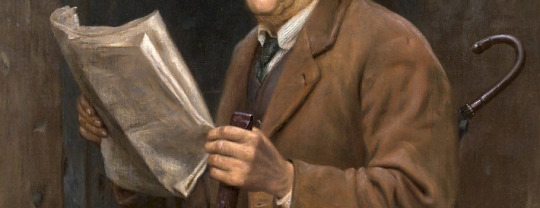
Borrow a Plot
Write a summary of 3 books or movies or stories you love.
Include important characters, major plot turns, and setting.
Here’s an example:
A teenage girl lives in a dystopian world where the USA has been divided into 13 Districts, and every year children are chosen from each district to fight to the death. The teenage girl volunteers to fight in place of her sister. She tries to survive while also protesting against the evil Capital and (maybe) falling in love. (Hunger Games)
Then, choose one of the summaries and start changing around different elements - characters, setting, plot turns, adjectives, verbs, etc.
See where those changes take you, and keep writing when you get inspired. Here’s an example:
A teenage girl lives in a future where the oceans have risen and everyone lives on small islands. The water is controlled by pirates who demand a sacrifice each year to keep the island safe. The girl is chosen, but in a storm, she’s rescued by a different kind of pirate ship - one made up of former would-be sacrifices who act as pirates against the pirates. And…
Borrow a Character
Invent a history or future for someone.
Examples: Maybe it’s a friend you lost touch with after college, a teacher you had, a family member you’ve heard stories about, or just someone you’ve seen in photos or on the bus. A novel starring your great-grandmother, inspired by pictures you’ve seen of her (even if you'd never really heard anything about her).
Questions to consider: Who is the person that intrigues you? What was their childhood like? What did they dream of? What was their greatest desire? What obstacles did they face? What was their greatest triumph?
Finally (since most novels aren’t someone’s entire life story), you have to find the story:
What part of that imagined life has the most drama, the most ups and downs? A moment of adventure or possibility or danger, when things changed? Remember, you’re INVENTING this person, so feel free to let your imagination run free.
News You Can Use
Pick an event from the news.
Imagine it from the perspective of different people involved with it.
Example: A story about a river flooding might include the single mother driving her two kids on a camping trip, the park ranger called in to help, the farmer who lives down the road.
Feel free to use the basics of the news story for inspiration, but make up your own details - change the place, the time, the specifics of the people involved (age, gender identity, personality).
What news stories have stuck with you?
Questions to consider: What kind of people might be involved? What are their lives like? How did they end up in that situation? What will they have to do to get out of it? What might have happened years before or what might happen years after?
A Whole New World
Scroll through a list of photos (for example, this list) until you find one, or more, that sparks something for you, then pause and write your questions, wonderings, and ideas.
Questions to consider: What kind of place is this? How did it get this way? Who might live or travel through it? How do they feel? What is it like for them there? What challenges do they face?
Source
#writing inspiration#plot#writeblr#writing reference#spilled ink#character development#on writing#dark academia#character building#literature#writers on tumblr#writing prompt#poetry#poets on tumblr#writing inspo#writing ideas#creative writing#writing advice#writing tips#writing resources
63 notes
·
View notes
Text
been thinking about Medea lately, and I think I’ve finally figured out why the attitude of “wow Medea was right, go off queen” (e.g. this post) really gets on my nerves: I think it’s sexist!
like, let’s be absolutely clear: Medea’s actions at the end of the Euripides play are deeply, deeply evil. Jason and Kreon treat her horribly, and there’s no excuse for their behavior, but like...Medea slaughters two innocent children and an innocent woman in cold blood, not to protect herself or someone else, but to ensure Jason’s suffering. that’s evil.
the idea that Medea could possibly be justified in such an action fundamentally requires us to hold her to a lower moral standard than a man in her same position. the implication is that Medea’s experience as a woman in Greek society entitles her to revenge at any cost: she has been wronged, so punishment is hers to exact. we don’t consider this acceptable when Achilles is asserting that his grief over Patroclus entitles him to the emotional torture of Priam, and in fact the great human moment of the Iliad is Priam’s plea to Achilles to return Hector’s corpse. same moral standard applies to Medea. her rage over her mistreatment is not the problem: her violence against innocent people in an attempt to drag Jason down with her is.
which is not to say that I think Medea is a one-dimensional character! I think Euripides was really onto something with the way Medea agonizes over what to do during the play, by turns committing to this great evil and shrinking back in horror at what she’s contemplating. I also like the emphasis he places on Medea’s divine origins, her connection to the world of the gods via both her bloodline and her practice of magic. it creates this sort of dualism in her character: there’s Medea the human woman, who’s deeply in love with Jason and in agony at his betrayal, who loves her children and is terrified of what will become of them, and of her, once she’s forced to leave Corinth. this Medea is angry and scared, helpless to save herself or her children, helpless to make Jason understand how badly he’s hurting her.
and then there’s Medea daughter of the sun, Medea the hero, whose response to Jason’s betrayal is to make his life a living hell. except Medea-daughter-of-the-sun and Medea-the-human don’t exactly share the same value set: the former is the latter with all of her humanity stripped away, whose purpose is wholly aligned towards divine justice. but divine-Medea is powerful, and if human Medea only lets her, she can make damn sure that neither of them ever feel helpless again.
honestly my ideal version of the play is a tragedy about Medea’s fall, whose central tension is whether the human part of her will give in to the divine part of her under the stress of betrayal and rejection. at the end of the play, Medea gets everything she ever wanted (power, glory, fear, vengeance)-- all it costs is her humanity. but I think that only works if you frame Medea’s actions at the end of the play as horrific, rather than a triumph; if you take the morality of her actions seriously, as opposed to justifying them prima facie because she’s been through hell.
733 notes
·
View notes